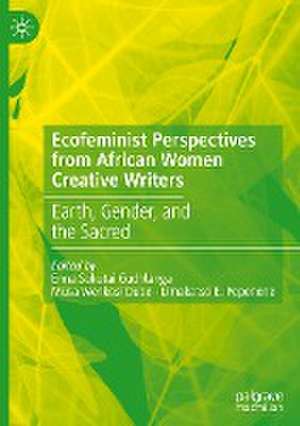Ecofeminist Perspectives from African Women Creative Writers: Earth, Gender, and the Sacred
Editat de Enna Sukutai Gudhlanga, Musa Wenkosi Dube, Limakatso E. Pepeneneen Limba Engleză Hardback – 24 feb 2024
Preț: 783.98 lei
Preț vechi: 956.08 lei
-18% Nou
Puncte Express: 1176
Preț estimativ în valută:
150.01€ • 157.05$ • 124.13£
150.01€ • 157.05$ • 124.13£
Carte tipărită la comandă
Livrare economică 07-21 aprilie
Preluare comenzi: 021 569.72.76
Specificații
ISBN-13: 9783031485084
ISBN-10: 3031485084
Pagini: 270
Ilustrații: XVIII, 270 p. 1 illus.
Dimensiuni: 148 x 210 mm
Greutate: 0.5 kg
Ediția:2024
Editura: Springer International Publishing
Colecția Palgrave Macmillan
Locul publicării:Cham, Switzerland
ISBN-10: 3031485084
Pagini: 270
Ilustrații: XVIII, 270 p. 1 illus.
Dimensiuni: 148 x 210 mm
Greutate: 0.5 kg
Ediția:2024
Editura: Springer International Publishing
Colecția Palgrave Macmillan
Locul publicării:Cham, Switzerland
Cuprins
Chapter 1. African Eco-Feminisms--African Women Writing Earth, Gender and the Sacred.- Chapter 2. Restoring Religion to the Land: Gender, Race, and Ecology in the Literature of Paulina Chiziane.- Chapter 3. Creating while black and female: Tsitsi Dangarembga’s African feminist decolonial imaginary.- Chapter 4. Religion, Gender and Earth Categories in Lauri Kubuetsile’s But Deliver us from Evil (2019).- Chapter 5. Kwasuka-sukela: A new paradigm to the African stories of women in Futhi Ntshingila’s Shameless and They Got to You Too.- Chapter 6. The intersection of Earth, Gender and the Sacred in NoViolet Bulawayo’s We need new names: Eco-Critical African feminist and Social Semiotics perspectives.- Chapter 7. Postcolonial Dislocation and the Psyche: Connecting the dots in Tsitsi Dangarembga's This Mournable Body.- Chapter 8.- “That’s what happens when two worlds collide”: An intersectional reading of Bessie Heads short stories, “The Collector of Treasures and other Botswana Village Tales”.- Chapter 9.- Generational search for home: History, race and gendered perspectives in Yaa Gyasi’s Homegoing.- Chapter 10.- Border Crossing: Religion, Gender, Race and Class in the Journeys of Ifemelu in Americanah.- Chapter 11. The Dragonfly Sea: The Sea, the Land and One African Woman’s Voyage-in.- Chapter 12. The Victims: An African-Ecofeminist Reading.- Chapter 13. Marginality, cultural positioning and religion in ’Mpho ’M’atsepo Nthunya’s Singing Away the Hunger: Stories of a life in Lesotho.- Chapter 14. All Water is Connected: African Earth Spirituality and Queering Identity in AkwaekeEmezi’s Freshwater.- Chapter 15. Earth, Gender and Religion in Zambia: An Eco-Feminist Reading of Sula and Ja, A Novel by Ellen Banda-Aaku.
Notă biografică
Enna Sukutai Gudhlanga is Associate Professor in the Department of Languages and Literature at Zimbabwe Open University.
Musa Wenkosi. Dube is Professor of New Testament at the Candler School of Theology, Emory University, USA.
Limakatso Pepenene is Senior Lecturer in the French Department at the National University of Lesotho.
Musa Wenkosi. Dube is Professor of New Testament at the Candler School of Theology, Emory University, USA.
Limakatso Pepenene is Senior Lecturer in the French Department at the National University of Lesotho.
Textul de pe ultima copertă
This volume explores contemporary African women’s creative writing, highlighting their contributions to ecofeminist theology. Contributors address the following questions: How do contemporary African women writers depict the Earth/land/environment and its relationship to women in various contexts? How is religion featured in African women’s writing? How does religious literature (scriptures) form an intertextual layer in African women’s writing? The contributors proceed by analyzing the intersection of religion, gender, class, sexuality, colonialism, and ecology in selected texts written by African women. They bring these texts into conversation with broader eco-feminist theological scholarship, exploring the potential of literary writing to contribute to theological discourse of liberation and social justice in the African and global arena.
Enna Sukutai Gudhlanga is Associate Professor in the Department of Languages and Literature at Zimbabwe OpenUniversity.
Musa Wenkosi. Dube is Professor of New Testament at the Candler School of Theology, Emory University, USA.
Limakatso Pepenene is Senior Lecturer in the French Department at the National University of Lesotho.
Enna Sukutai Gudhlanga is Associate Professor in the Department of Languages and Literature at Zimbabwe OpenUniversity.
Musa Wenkosi. Dube is Professor of New Testament at the Candler School of Theology, Emory University, USA.
Limakatso Pepenene is Senior Lecturer in the French Department at the National University of Lesotho.
Caracteristici
Covers an interdisciplinary range of fields Focuses on contemporary African women's novels Highlights marginalised communities in their struggle against various forms of oppression
